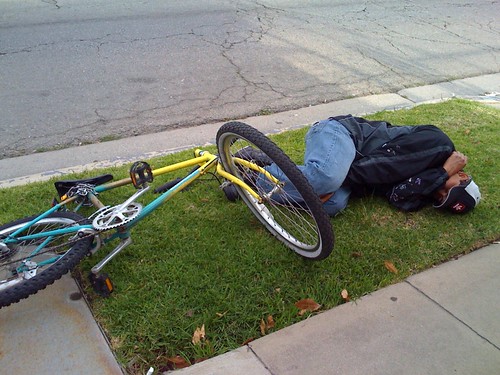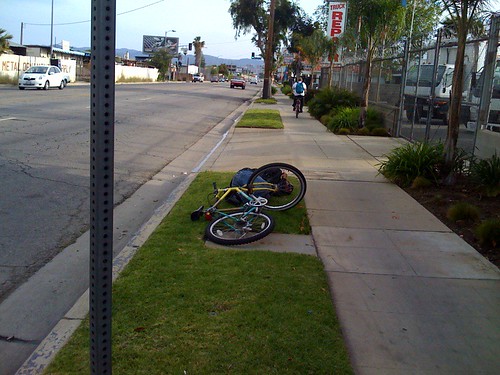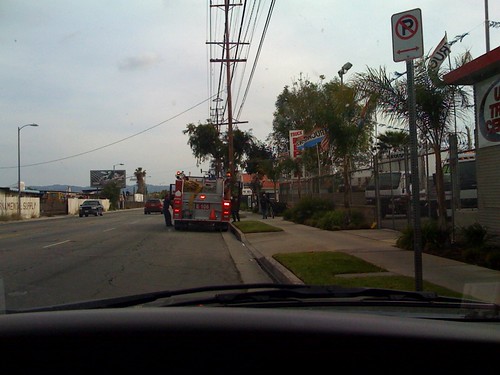You are herecontent / My Lesson In "ACTION" From The Murder Of Kitty Genovese
My Lesson In "ACTION" From The Murder Of Kitty Genovese
by Linda Milazzo
Mid-afternoon on Wednesday, driving along a street in the West San Fernando Valley of Los Angeles, I saw this man lying on the parkway of the road.
At first I drove past him because I was moving too quickly to stop. But I turned my car onto the nearest street, made a quick u-turn, and rushed back to him. While I was maneuvering back, I noticed that no one else was stopping. Drivers glanced over and drove right on by. Two women walked by him as I waited to turn my car. They barely looked at him. They never tried to rouse him or even stop their conversation. They felt no moral imperative to assist him. Conveniently for them, he was positioned out of their way.
As I made my u-turn to get to him, and finally parked, a bicyclist rode right by him, and he, too, never stopped. I watched in amazement as the biker peered down for a second and rode past him. That was it. All pedal - no mettle.
Who are WE in America?? What have WE become?
Americans don't live in the same war zones we enable and create. This isn't Iraq or Afghanistan or Gaza or Darfur. In those despairing places people lie on the street everyday. Of course in Iraq, Afghanistan, Gaza and Darfur, to name but some of our engineered horrors, blood usually covers their bodies. There was no blood covering this man.
How lucky to be in America!
Still this man, whom the pedestrians, bikers and autos passed by, could have been in diabetic shock, had a heart attack, suffered internal injuries from an accident, been unconscious from his fall, had a seizure, or been just plain drunk. A myriad possibilities could have overcome him. Yet his observers carried on despite seeing his body. How different they would feel were that body their own, or that of their loved one. But if it's not about us or those we personally love, often it just doesn't matter. We can be that selfish -- unless we are predisposed toward compassion, are taught from a previous lesson -- or both.
When I was 14 years old in New York City, I was horrified by an infamous murder that occurred in 1964 in my burough of Queens. A young woman, Kitty Genovese, was brutally attacked and murdered, yet her screams for help were casually ignored by most of her own neighbors. For those who don't know this story, and for those unaccustomed to offering help, here are the gruesome details that may teach you that hard lesson if someone needs your help.
Kitty Genovese had driven home in the late night of March 13, 1964. Arriving home at about 3:15 a.m. and parking about 100 feet (30 m) from her apartment's door, she was approached by Winston Moseley, a business machine operator.[2]
Moseley ran after her and quickly overtook her, stabbing her twice in the back. Genovese screamed, "Oh my God, he stabbed me! Help me!" It was heard by several neighbors, but on a cold night with the windows closed, only a few of them recognized the sound as a cry for help. When one of the neighbors shouted at the attacker, "Let that girl alone!", Moseley ran away and Genovese slowly made her way toward her own apartment around the end of the building. She was seriously injured, but now out of view of those few who may have had reason to believe she was in need of help.
Records of the earliest calls to police are unclear and were certainly not given a high priority by the police. One witness said his father called police after the initial attack and reported that a woman was "beat up, but got up and was staggering around."[6] Other witnesses observed Moseley enter his car and drive away, only to return ten minutes later.
In his car, he changed his hat to a wide-rimmed one to shadow his face. He systematically searched the parking lot, train station, and small apartment complex, ultimately finding Genovese, who was lying, barely conscious, in a hallway at the back of the building, where a locked doorway had prevented her from entering the building. [7]
Out of view of the street and of those who may have heard or seen any sign of the original attack, he proceeded to further attack her, stabbing her several more times. Knife wounds in her hands suggested that she attempted to defend herself from him. While she lay dying, he sexually assaulted her. He stole about $49 from her and left her dying in the hallway. The attacks spanned approximately half an hour.
This horrific, perhaps preventable murder, became a blight on New York and New Yorkers for years. I took it so personally as a teenager that I wished for the longest time I'd been able to save her. Of course that was impossible since I lived at least 20 miles away. But in those days, murders seemed to have a greater social impact. They were more rare. Only organized crime and militarism were habitual. Individuals tended to take personal responsibility for communities, neighbors and family - which made the Genovese case an anomaly for its time.
The psychology of the neighbors' passivity in the Genovese case has been studied for years. The two social phenomena thought by professionals to best describe the neighbors' inaction are Diffusion of Responsibility and Bystander Effect. I apply both these unfortunate social phenomena to those who oppose war, corporate crime, and other injustices, but take no personal action to stop them. Instead they allow others to fight their fights. Those very same people who tell me ,and maybe tell you, that they don't need to be ACTIVE because I'm/we're ACTIVE for them. The inaction from these dysfunctional social phenomena does not lead to success. It leads to failure. Murdered innocents, endless war, corporate crime, and people lying unattended on our streets, are the results of their inaction.
In my very lay opinion, the social phenomenon that seems to apply to those who ignored Wednesday's bicycle man is Bystander Effect, although callousness and indifference are also distinct possibilities. I personally don't buy "lack of time" as an excuse in this technological era since anyone can phone for help while driving.
Bystander Effect is defined as:
A social psychological phenomenon in which individuals are less likely to offer help in an emergency situation when other people are present. The probability of help is inversely proportional to the number of bystanders. In other words, the greater the number of bystanders, the less likely it is that any one of them will help.
Despite the lack of traffic shown in the photos, there were plenty of people who saw this young man and chose not to respond. I have no idea how long he was on the street before I saw him, which increases the numbers of those who could have helped. But there is a positive end to his saga.
When I got to the downed man and tapped him on the shoulder, at first he wouldn't respond. After several nudges he finally came to. He attempted to stand but he couldn't. I called the paramedics and they arrived within minutes. True to Bystander Effect, I was the only person who'd called them. The paramedics coaxed him to his feet, spoke with him for a few moments, and sent him off with his bike. He may have been drunk.
I sat for a while and watched him unsteadily amble away. Here's the paramedic truck and the still disoriented man walking up the street with his bike. Why he wasn't hospitalized for further observation is an issue directed to our healthcare debate. Clearly this man wasn't wealthy.
In the end, it doesn't matter what reason this young man was lying on the street. Be it medical or chemical, I still would have stopped. I refuse to indulge in Bystander Effect and won't live in the guilt of inaction. In part it may just be my nature, but it's also my lesson from the murder of Kitty Genovese.
It would be hard to imagine any positive outcome from that brutal killing 45 years ago. But if Kitty's murder has prevented Bystander Effect or Diffusion of Responsibility in those who were offended by the human failings that resulted in Kitty's death, than Kitty Genovese was a hero whose death may have saved many lives.
Author's note: I'm remembering another young hero today who should not have been murdered, and whose 30th birthday was yesterday. Happy Birthday Rachel Corrie. We continue your commitment to humanity and peace, and we wish you were with us today!
- Login to post comments
-

- Email this page
- Printer-friendly version










I was probably that same age when the Kitty Genovese murder happened. I did not live in New York, but it was all over the news. People felt terrible about it. I believe that skin color and prejudice can certainly influence how people respond to someone in a case like the one you describe. I had a bike accident once and everyone was very helpful to me. Interestingly, the people who stayed with me until my husband came were immigrants.
4Peace